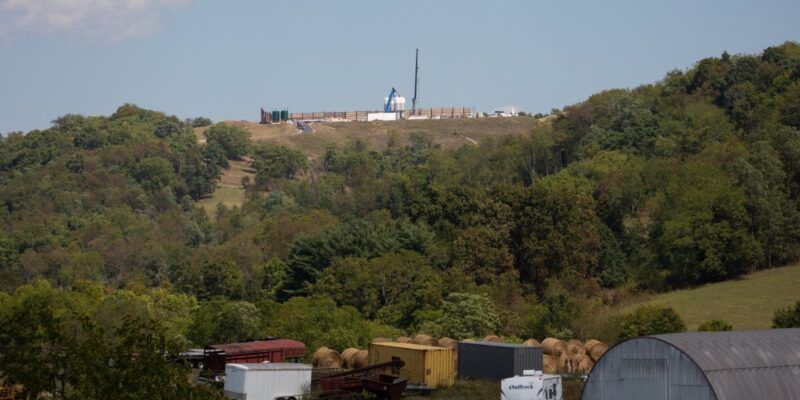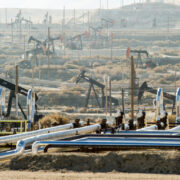
This story was originally published by Inside Climate News and is reproduced here as part of the Climate Desk collaboration.
Since Vice President Kamala Harris became the Democratic nominee for president this summer, national attention on the issue of fracking in Pennsylvania—and what it means for the outcome of the election in this key swing state—has reached new highs. But what do Pennsylvanian voters really think about fracking? And what bearing do those opinions have on their choice for president?
A new poll of likely voters in Pennsylvania attempts to answer those questions. The poll, commissioned by the Appalachia-based nonprofit Ohio River Valley Institute, echoes previous polling in that it shows that while Pennsylvanians are divided on fracking, a significant majority support more regulations on the natural gas industry. The poll also shows that energy and natural gas issues are not among voters’ most important priorities, something that is often overlooked in national conversations about the political implications of the practice.
When asked which two issues were most “personally motivating” to them when casting a vote, voters selected issues like jobs, border security, preserving democracy, reproductive rights, and cutting taxes ahead of issues like climate change and reducing energy costs.
Fracking is a divisive issue in Pennsylvania, and support for it is highly partisan. Fifty-one percent of all Pennsylvania voters say they support fracking, 30 percent say they’re opposed and 19 percent aren’t sure either way, which is indicative of the fact that fracking is not the most important issue for many voters. Eighty-one percent of Republicans support spending taxpayer money on more fracking and pipeline development, and only 43 percent of Democrats do. Support for fracking is regionally driven, with voters who live in areas near Pittsburgh, where the fracking industry is concentrated in Pennsylvania, recording the highest percentage of support.
“A large section of the state’s population lives outside the shale play. They’ve never seen a fracking pad..”
Just 42 percent of respondents said they’d support an outright ban of fracking in Pennsylvania, one reason that Republicans like former president Donald Trump and Senate candidate Dave McCormick have tried to paint their Democratic opponents as proponents of a ban. The number of voters who would support a ban is lower among independents, at only 38 percent.
Fifty-two percent of respondents agreed with the statement “fracking can be done in a way that protects the health and safety of my family.” This belief is at odds with the ninth edition of the compendium of findings and reports on fracking from the Concerned Health Professionals of New York, which states it has found “no evidence that fracking can be practiced in a manner that does not threaten human health directly or without imperiling climate stability upon which human health depends.”
Forty-eight percent agreed that “living near fracking activity can lead to a higher risk of asthma, childhood lymphoma, and other health problems.” This statement closely mirrors the findings of a set of 2023 studies on fracking and public health from the University of Pittsburgh and Pennsylvania Department of Health.
Christopher Borick, director of Muhlenberg College’s Institute of Public Opinion, which polls Pennsylvanians about their views on fracking, said this new poll’s findings “generally align” with what he’s seen in polling over the years: Although Pennsylvania is the second-largest producer of natural gas in the United States, Pennsylvanians have long been divided over fracking. Pennsylvanians have “significant reservations” about fracking and its impacts on health and the environment, even as they tend to view it as economically beneficial.
“It’s a big fracking state. But that doesn’t mean it’s monolithic in its views,” Borick said. “A large section of the state’s population lives outside the shale play. They’ve never seen a fracking pad. The idea that everybody’s in the industry is absolutely false.”
There’s also no evidence that fracking is an electoral “slam dunk” for politicians seeking to win the state, he said. Muhlenberg’s polling has shown similar results as this poll when voters are asked to name their most important issues. “Fracking doesn’t register,” he said.
“There’s just a significant lack of recognition about the drawbacks that people perceive.”
Perhaps most heartening for environmental activists who have long raised the alarm about evidence showing that fracking harms public health, the environment, and the climate, the poll shows broad bipartisan support for tougher regulations on the fracking industry than currently exist. Ninety-four percent of respondents said they supported mandatory disclosure of the chemicals companies use to frack, 93 percent said they supported safer transportation of fracking waste and 90 percent supported increasing the distance the wells can be drilled near hospitals and schools.
“I was genuinely surprised about the level of support for increased restrictions,” said Sean O’Leary, a senior researcher in energy and petrochemicals at the Ohio River Valley Institute. O’Leary said support for more regulation has grown since the last time the organization conducted a poll on this topic three years ago.
Although he was surprised, O’Leary said the numbers made sense to him. “My sense of being on the ground in the region is that most people are pretty deeply ambivalent about fracking. It’s not a pleasant thing to have around or nearby,” he said. “I suspect most of the concern about the industry and the desire for greater regulation simply comes from people’s firsthand experience with it.”
In listening to national discussions of voters’ feelings about the issue, he said, this fact does not seem to be well-represented. “There’s just a significant lack of recognition about the drawbacks that people perceive, and the desire that they feel to have the industry’s effects on quality of life and pollution and health better managed and mitigated,” he said.
Some people in Pennsylvania continue to associate fracking with jobs and economic gains, but that does not mean they are happy with the industry’s disruptive impacts on their daily lives.
The regulations suggested in the polling are similar to policy recommendations made in a 2020 grand jury report on fracking from the state attorney general’s office, then led by the current governor, Josh Shapiro. The goal of these recommendations was to “create a more comprehensive legal framework that would better protect Pennsylvanians from the realities of industry operations.”
In an echo of the three regulations that voters were most supportive of, the report recommended that well setbacks be increased from 500 feet to 2,500 feet, that companies publicly share which chemicals are used in fracking operations and that the transportation of fracking waste be made safer. None of these three recommendations have been implemented.















